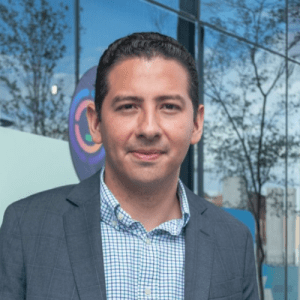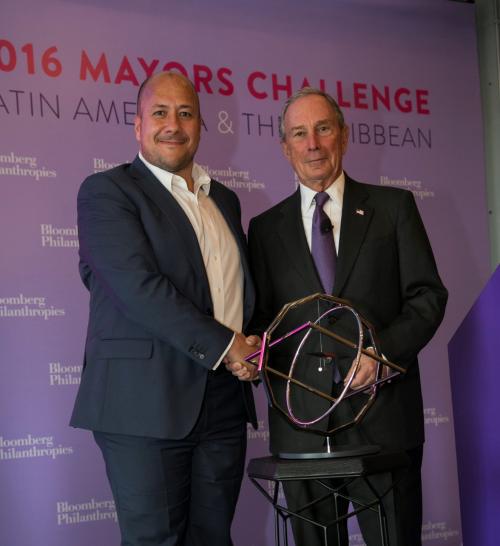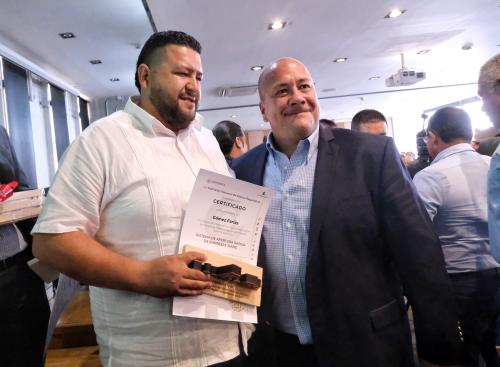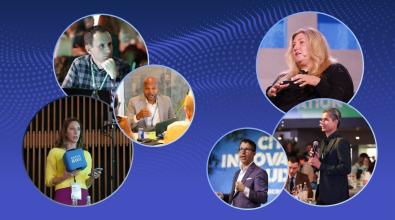Mexico mayors get results as a digital innovation spreads
How a Bloomberg Philanthropies investment has become a case study in city-to-city learning.
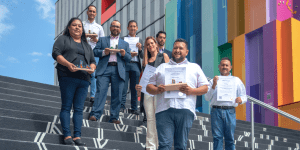
Local leaders from four Mexican cities recently received federal certifications recognizing their success in streamlining business permitting. Those local efforts were built on Guadalajara's Visor Urbano program, a winner in the 2016 Bloomberg Philanthropies Mayors Challenge.
Last year, Miguel Ángel Ibarra became one of Mexico’s youngest mayors when he was elected to lead Cocula, a city of 30,000 that is best known as the birthplace of mariachi. The now-28-year-old lawyer entered office intent on using technology to shake up local government, to make an impact residents could feel, and to do it quickly.
Shortly before Ibarra took office, he spoke with a team from the state government of Jalisco. The nearby city of Guadalajara, with support from Bloomberg Philanthropies, had developed software that, among other things, digitizes the process for issuing business licenses. They had a compelling offer: Cocula could have the software, plus training for staff in how to use it, for free.
The young mayor-elect immediately saw the potential. Like many cities in Mexico, Cocula’s local administration still runs largely on paper—and business licensing was no exception. For residents, obtaining a license usually meant plodding from one city office to another, only to be told that they needed to come back with more documents. The back and forth could take a month, although some residents expedited the process by paying a small bribe. Many more skipped the licensing process altogether, operating without licenses and depriving the city of revenue it needed to make improvements to other services.
“The process was really difficult, complicated, and corrupt,” Ibarra says. “Whoever offered more money to the government was the one who got the business permits.”
Ibarra took office October 1, implemented the new software October 2, and by October 14 the city’s month-long licensing process was cut to just a couple days. Residents can handle almost all of it online, although most of them prefer to use the system in person, at the service window the mayor set up under an arcade of arches and columns near city hall’s front door.
Luis Fernando Salcedo Zaueta, who sells motorcycles, got his license in November. “It was really simple—I didn’t have any problems, and they didn’t ask me for [extra] money,” he says. “I’ve been in other cities, and you have to go back, and back again. Here, it was just one time. I delivered all the requirements and it was really quick.”
Over the past nine months, nearly 700 businesses have been licensed through the new system—a strong vote of confidence in Cocula’s new way of working. “People come from other cities to invest because they trust the government, that we do things without corruption and quickly,” Ibarra says. “That’s why we started immediately.”
The same transformation is taking place in municipalities across Jalisco—from Cabo Corrientes on the Pacific coast to Arandas 300 miles inland. More than two dozen cities have used the same open-source software to digitize their business licensing—and in nearly every case, make their first big leap into public-facing digital services. And critically, none of them are having to reinvent the wheel. Instead they’re all replicating an innovative solution built right in their backyard.
That solution, called Visor Urbano, was developed by Guadalajara after that city won $1 million in the 2016 Bloomberg Philanthropies Mayors Challenge. Their idea was to digitize the city’s paper-based processes for business licensing and construction permitting. The resulting product not only sped up those transactions for busy business owners. It also measurably reduced corruption: Bribe requests by municipal agents declined 74 percent as technology took away the discretion they once had to speed up the process or slow it down.
But Visor Urbano is more than just a success story for Guadalajara, Cocula, and other individual cities. It’s also a case study in how solutions spread from one city to another—and the ingredients necessary to accelerate the sort of sharing and learning that helps all cities innovate faster together. (Read more here on the secrets to Visor Urbano's replication success.)
The mayor who championed this project, Enrique Alfaro, later won election as governor of Jalisco. Encouraged by what Visor Urbano had achieved in Guadalajara, Alfaro set out to spread the solution to municipalities across the state, offering them the software and training at no cost. To lead the effort, he brought his city hall innovation team with him to work in the governor’s office. Additional support from Bloomberg Philanthropies enabled Alfaro’s team to keep updating the software, coach cities on how to use it, and scale up the impact.
[Read: Study finds Guadalajara's new licensing system dramatically reduced corruption]
Their progress has been remarkable. While Alfaro set out to connect a dozen Jalisco cities with the solution, it’s now been implemented in 25. Elsewhere in Mexico, the cities of San Pedro Garza García and Tepatitlán have also adopted Visor Urbano, and the state of Hidalgo is working on rolling it out to its municipalities as well. Cities in Argentina and Colombia are also considering the platform, and there’s growing interest in Europe, as well, after the Visor Urbano team’s recent presentation at the Creative Bureaucracy Festival in Berlin.
Mario Arauz, who served as Alfaro’s chief innovation officer in Guadalajara and now holds that role for Jalisco, says Visor Urbano has touched a nerve with reform-minded mayors who are eager to build a new relationship between local governments and residents based on transparency and trust. “It offers a chance to combine good technology with the political moment,” Arauz says. “For mayors who really care about the city, it’s an opportunity to legitimize what they’re saying, because it’s a ready-to-use tool that brings that value to their government.”
It also demonstrates a core tenet of Bloomberg Philanthropies' work with cities: That cities are stronger when they look to each other for solutions. “Mike Bloomberg used to borrow ideas from other cities all the time when he was mayor of New York City,” says Andrea Coleman of the Bloomberg Philanthropies Government Innovation team. “We’re strong believers that cities shouldn’t have to build every solution from scratch, and we’ve seen that effective innovations can spread. Sometimes they just need a little help.”
Learn more about how to adopt Visor Urbano and other proven Mayors Challenge-winning solutions here.
